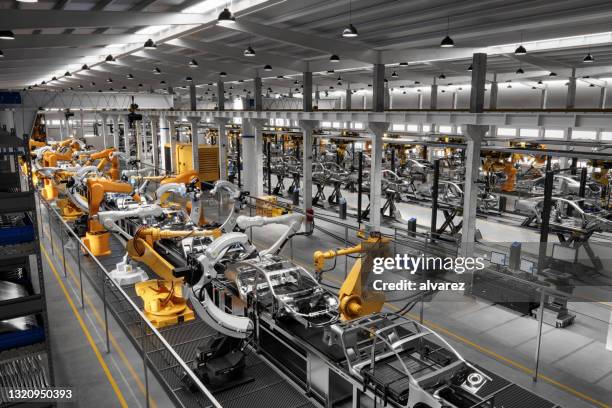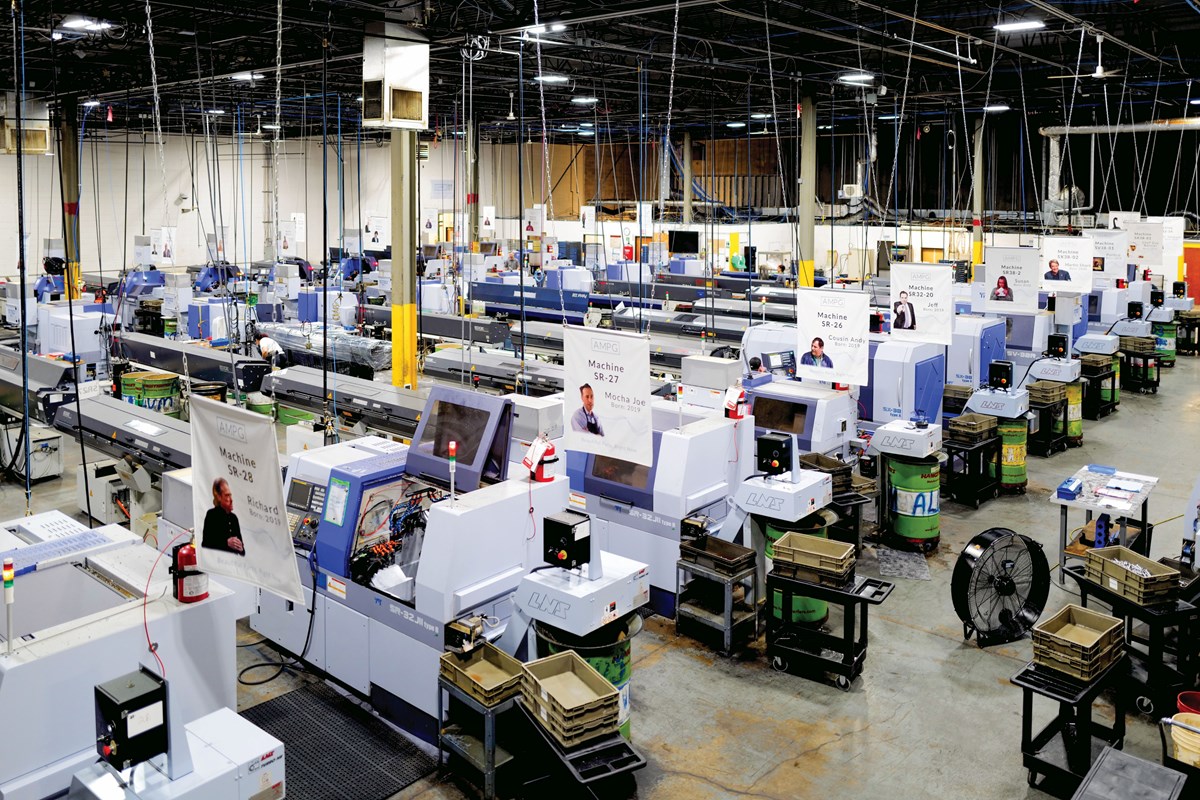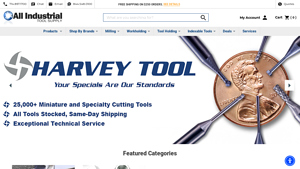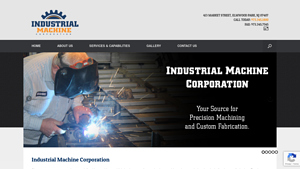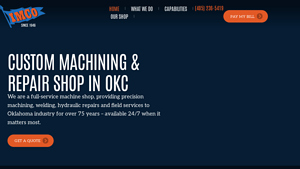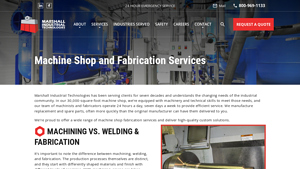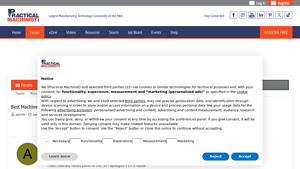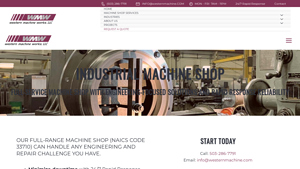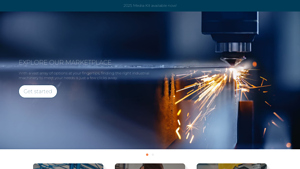Introduction: Navigating the Global Market for industrial machine shop
In the rapidly evolving landscape of global manufacturing, sourcing reliable industrial machine shop services can present a daunting challenge for international B2B buyers. Whether you’re seeking precision machining for aerospace components or custom fabrication for medical devices, the complexities of navigating supplier capabilities, quality assurance, and logistical considerations can be overwhelming. This comprehensive guide aims to demystify the process, offering insights into the diverse types of machine shops, their applications across various industries, and essential criteria for vetting suppliers effectively.
As you explore this guide, you’ll discover valuable information on cost structures, delivery timelines, and the importance of certifications, which are crucial for making informed purchasing decisions. We recognize that buyers from regions such as Africa, South America, the Middle East, and Europe—countries like Nigeria and Saudi Arabia—face unique market dynamics and challenges. Thus, this resource is tailored to equip you with actionable strategies and best practices to optimize your sourcing process.
By leveraging the insights provided here, you will be empowered to build resilient supply chains, mitigate risks associated with supplier selection, and ultimately enhance the performance of your operations. This guide is not just about finding a machine shop; it’s about fostering partnerships that drive innovation and growth in your business.
Understanding industrial machine shop Types and Variations
| Type Name | Key Distinguishing Features | Primary B2B Applications | Brief Pros & Cons for Buyers |
|---|---|---|---|
| CNC Machine Shop | Utilizes computer numerical control for precision machining | Aerospace, automotive, medical devices | Pros: High accuracy, scalability; Cons: Higher setup costs. |
| Job Shop | Offers custom machining services for various projects | Prototyping, small batch production | Pros: Flexibility, tailored solutions; Cons: Longer lead times. |
| Production Machine Shop | Focuses on high-volume manufacturing with standardized processes | Mass production of components | Pros: Cost-effective for large orders; Cons: Less customization. |
| Tool and Die Shop | Specializes in manufacturing tools and dies for production | Automotive, consumer goods | Pros: Expertise in tooling; Cons: Niche market limits. |
| Fabrication Shop | Combines machining with metal forming and assembly | Construction, heavy machinery | Pros: Comprehensive services; Cons: May lack specialized machining. |
What Are the Key Characteristics of CNC Machine Shops?
CNC (Computer Numerical Control) machine shops are characterized by their use of automated machinery that follows precise computer-generated instructions. This technology enables high levels of accuracy and consistency, making CNC shops ideal for industries such as aerospace, automotive, and medical device manufacturing. B2B buyers should consider the types of materials they need machined and the complexity of their designs, as CNC shops can handle intricate specifications but may involve higher setup costs.
How Do Job Shops Differ in Their Offerings?
Job shops are versatile facilities that cater to custom machining needs, making them suitable for prototyping and small batch production. They thrive on flexibility, allowing clients to request specific modifications and unique designs. However, buyers should be aware that this flexibility often results in longer lead times compared to other types of machine shops. When selecting a job shop, businesses should evaluate their project timelines and the complexity of their requirements.
What Advantages Do Production Machine Shops Provide?
Production machine shops are designed for high-volume manufacturing, employing standardized processes to produce large quantities of parts efficiently. They are particularly beneficial for B2B buyers looking for cost-effective solutions for mass production. While these shops excel in reducing per-unit costs, they may offer limited customization options, which can be a drawback for companies requiring unique specifications. Buyers should assess their volume needs and consider whether they can compromise on customization.
Why Are Tool and Die Shops Important for Certain Industries?
Tool and die shops focus on creating the specialized tools and dies used in manufacturing processes, making them crucial for industries such as automotive and consumer goods. Their expertise in tooling allows for the production of high-quality components with precise tolerances. However, the niche nature of tool and die shops can limit their market reach, and buyers should ensure that their specific tooling needs align with the shop’s capabilities.
How Do Fabrication Shops Enhance Machining Services?
Fabrication shops offer a blend of machining and metal forming services, providing comprehensive solutions that include cutting, bending, and assembly. They are well-suited for industries like construction and heavy machinery, where integrated services can streamline production. However, buyers should note that while fabrication shops can handle a wide range of tasks, they may not possess the specialized machining capabilities of dedicated machine shops. Evaluating project requirements will help buyers choose the right type of shop for their needs.
Key Industrial Applications of industrial machine shop
| Industry/Sector | Specific Application of industrial machine shop | Value/Benefit for the Business | Key Sourcing Considerations for this Application |
|---|---|---|---|
| Aerospace | Precision components for aircraft systems | Enhanced safety and reliability of flight operations | Certifications (e.g., AS9100), material traceability, and testing capabilities. |
| Medical Devices | Custom surgical instruments and implants | Improved patient outcomes and compliance with regulations | Compliance with ISO 13485, biocompatibility, and prototyping capabilities. |
| Automotive | Engine components and aftermarket parts | Increased performance and extended vehicle lifespan | Quality assurance processes, lead times, and volume capabilities. |
| Heavy Machinery | Parts for construction and mining equipment | Reduced downtime and improved operational efficiency | Material selection, durability standards, and JIT delivery options. |
| Electronics | Housing and enclosures for electronic devices | Enhanced product durability and aesthetic appeal | Precision machining capabilities, surface finishing, and rapid prototyping. |
How is Industrial Machine Shop Utilized in Aerospace Applications?
In the aerospace sector, industrial machine shops play a crucial role in manufacturing precision components for aircraft systems, including landing gear, engine mounts, and other critical parts. These components must meet stringent safety and reliability standards, making the sourcing process highly specialized. Buyers in this industry should look for machine shops with certifications such as AS9100, which indicates adherence to quality management systems in aerospace manufacturing. Additionally, the ability to provide material traceability and rigorous testing capabilities is essential for ensuring compliance with industry regulations.
What Role Does Industrial Machine Shop Play in Medical Device Manufacturing?
Industrial machine shops are integral to the production of custom surgical instruments and implants in the medical device industry. These products require high precision and must comply with strict regulatory standards to ensure patient safety. Buyers should prioritize sourcing from machine shops that are ISO 13485 certified, indicating their commitment to quality management systems specific to medical devices. Moreover, capabilities in biocompatibility testing and rapid prototyping are vital for developing innovative medical solutions that meet the evolving needs of healthcare providers.
Why is Industrial Machine Shop Important for Automotive Parts Production?
In the automotive industry, industrial machine shops are essential for producing engine components and aftermarket parts that enhance vehicle performance. These components must be manufactured to exact specifications to ensure a proper fit and function. For international buyers, it is crucial to partner with machine shops that have robust quality assurance processes and can provide detailed documentation. Additionally, understanding lead times and volume capabilities is important for maintaining a steady supply chain, especially in regions like Africa and South America, where logistics may pose challenges.
How Does Industrial Machine Shop Support Heavy Machinery Manufacturing?
Heavy machinery relies on industrial machine shops for the production of durable parts used in construction and mining equipment. The ability to produce components that withstand harsh environments is critical for operational efficiency and reducing downtime. Buyers should consider machine shops that excel in material selection and can meet durability standards. Furthermore, Just-In-Time (JIT) delivery options can significantly benefit businesses by minimizing inventory costs while ensuring timely access to essential parts.
What is the Importance of Industrial Machine Shop in Electronics?
In the electronics sector, industrial machine shops are responsible for creating housing and enclosures for various electronic devices. These components not only protect sensitive electronics but also contribute to the product’s overall aesthetic appeal. Buyers should seek machine shops with advanced precision machining capabilities and expertise in surface finishing techniques. Rapid prototyping capabilities are also a significant advantage, allowing businesses to bring innovative electronic products to market faster and more efficiently.
3 Common User Pain Points for ‘industrial machine shop’ & Their Solutions
Scenario 1: Inconsistent Quality and Delivery Times
The Problem: B2B buyers often encounter significant challenges related to the quality and timeliness of products delivered by industrial machine shops. This inconsistency can lead to production delays, increased costs, and strained relationships with end clients. For instance, a buyer from a manufacturing company in Nigeria may place a bulk order for precision parts needed for machinery assembly, only to receive parts that do not meet the specified tolerances or arrive weeks late. Such experiences not only disrupt production schedules but also compromise product integrity and customer satisfaction.
The Solution: To mitigate these issues, buyers should prioritize selecting machine shops with a proven track record of quality and reliability. Conduct thorough research by reviewing past client testimonials, industry awards, and certifications like ISO 9001, which indicates a commitment to quality management. Implement a robust vendor assessment process that includes site visits or audits to observe operations firsthand. Additionally, establish clear communication channels with the shop to ensure that specifications are understood and agreed upon before production begins. Utilizing tools such as Just-In-Time (JIT) delivery and Kanban systems can also help in maintaining inventory levels and ensuring timely delivery.
Scenario 2: Lack of Technical Expertise and Support
The Problem: Many B2B buyers, especially those in emerging markets like South America or the Middle East, face challenges due to a lack of technical knowledge regarding machining processes and materials. This knowledge gap can lead to miscommunication about project requirements and result in suboptimal product outcomes. For example, a buyer who is unfamiliar with CNC machining may struggle to specify the right materials and tolerances, leading to wasted resources and increased costs.
The Solution: To address this pain point, buyers should actively seek partnerships with machine shops that offer technical support and consultation services. Look for shops that provide pre-project consultations to discuss technical specifications, material selection, and machining processes. Many reputable machine shops also offer design for manufacturability (DFM) services, which can help buyers optimize their designs for production efficiency. Consider investing in training programs for your team or even collaborating with the machine shop to facilitate knowledge transfer. This proactive approach not only enhances product quality but also fosters a collaborative relationship with the machine shop.
Scenario 3: Limited Customization Capabilities
The Problem: Industrial machine shop buyers often struggle with finding suppliers that can accommodate custom orders tailored to specific needs. For businesses in diverse sectors, such as aerospace or medical devices, the ability to customize parts is crucial. A buyer in Europe might need a specialized component that requires unique specifications, but many machine shops operate with rigid templates and standard offerings, limiting flexibility and innovation.
The Solution: To overcome this challenge, buyers should identify machine shops that specialize in custom machining services. When sourcing suppliers, inquire about their capabilities in terms of flexibility, material handling, and advanced machining technologies. Engage in discussions about past projects that involved custom solutions, which can provide insight into their experience and creativity. Furthermore, establishing a collaborative relationship with the shop during the design phase can lead to innovative solutions that meet specific requirements. Leveraging technologies like 3D printing for prototyping can also facilitate the development of custom parts, allowing for quicker iterations and adjustments before full production.
Strategic Material Selection Guide for industrial machine shop
What Are the Key Properties of Common Materials Used in Industrial Machine Shops?
In the realm of industrial machine shops, the selection of materials is critical to ensuring product performance, durability, and cost-effectiveness. Here, we analyze four common materials: steel, aluminum, titanium, and plastics, focusing on their properties, advantages, disadvantages, and considerations for international B2B buyers.
How Does Steel Perform in Industrial Applications?
Steel is one of the most widely used materials in industrial machine shops due to its excellent mechanical properties. It boasts high tensile strength, good ductility, and resistance to wear. Steel can withstand high temperatures and pressures, making it suitable for a variety of applications, including automotive and aerospace components.
Pros: Steel is durable and cost-effective, making it a popular choice for mass production. Its versatility allows it to be used in various forms, such as sheets, bars, and tubes.
Cons: On the downside, steel is prone to corrosion if not properly treated, which can lead to increased maintenance costs. Additionally, its weight can be a disadvantage in applications where lightweight materials are preferred.
Impact on Application: Steel is compatible with a wide range of media, including oils and fuels, but may require protective coatings in corrosive environments.
International Considerations: Buyers from regions like Africa and the Middle East should be aware of compliance with standards such as ASTM A36 for structural steel. Local regulations may also dictate specific grades suitable for their applications.
Why Choose Aluminum for Lightweight Applications?
Aluminum is favored for its lightweight nature and excellent corrosion resistance. It has a lower density than steel, making it ideal for applications where weight reduction is essential, such as in aerospace and automotive industries.
Pros: Aluminum is easy to machine and can be anodized for enhanced corrosion resistance. Its thermal and electrical conductivity is also superior to that of steel.
Cons: However, aluminum has lower tensile strength than steel, which may limit its use in high-stress applications. Additionally, it can be more expensive than steel, impacting overall project budgets.
Impact on Application: Aluminum’s compatibility with various media is generally good, but it may not be suitable for high-temperature environments without specific alloying.
International Considerations: B2B buyers should consider compliance with standards such as ASTM B221 for aluminum extrusions. Understanding local preferences for aluminum alloys can also influence purchasing decisions.
What Are the Benefits of Using Titanium in Industrial Machine Shops?
Titanium is known for its exceptional strength-to-weight ratio and outstanding corrosion resistance. It is often used in high-performance applications, including aerospace and medical devices.
Pros: Titanium is highly durable and can withstand extreme temperatures and aggressive environments, making it suitable for demanding applications.
Cons: The primary drawback of titanium is its high cost and complexity in manufacturing, which can lead to longer lead times and higher overall project costs.
Impact on Application: Titanium is compatible with a variety of media, including seawater and aggressive chemicals, making it an ideal choice for marine and chemical processing applications.
International Considerations: Buyers should be aware of standards such as ASTM B348 for titanium bars and rods. Compliance with international regulations is crucial, especially for medical and aerospace applications.
How Do Plastics Fit Into the Material Selection Process?
Plastics, including polycarbonate and nylon, are increasingly used in industrial machine shops for their versatility and lightweight properties. They offer good chemical resistance and can be molded into complex shapes.
Pros: Plastics are generally low-cost and easy to manufacture, which allows for rapid prototyping and production.
Cons: However, they may not provide the same strength or thermal resistance as metals, limiting their use in high-stress applications. Additionally, plastics can degrade under UV exposure or extreme temperatures.
Impact on Application: Plastics are compatible with a wide range of chemicals, but their suitability for high-temperature applications can be limited.
International Considerations: Buyers should consider compliance with standards such as ASTM D638 for tensile properties of plastics. Understanding local regulations regarding plastic recycling and disposal is also essential.
Summary Table of Material Selection for Industrial Machine Shops
| Material | Typical Use Case for industrial machine shop | Key Advantage | Key Disadvantage/Limitation | Relative Cost (Low/Med/High) |
|---|---|---|---|---|
| Steel | Structural components, automotive parts | High strength and durability | Prone to corrosion | Medium |
| Aluminum | Aerospace, automotive, lightweight applications | Lightweight and corrosion-resistant | Lower strength than steel | Medium to High |
| Titanium | Aerospace, medical devices | Exceptional strength-to-weight ratio | High cost and manufacturing complexity | High |
| Plastics | Prototyping, non-structural components | Low-cost and easy to manufacture | Limited strength and thermal resistance | Low |
This strategic material selection guide provides valuable insights for B2B buyers, enabling informed decisions that align with their specific industrial needs and regional compliance requirements.
In-depth Look: Manufacturing Processes and Quality Assurance for industrial machine shop
What Are the Key Stages in the Manufacturing Process of an Industrial Machine Shop?
The manufacturing processes in an industrial machine shop encompass several critical stages, each designed to transform raw materials into finished components while ensuring precision and quality.
1. Material Preparation: How Is Raw Material Handled?
The first step in the manufacturing process is material preparation, which involves selecting the appropriate raw materials based on the specifications of the final product. Common materials include metals like aluminum, steel, and titanium, as well as plastics and composites. This stage may involve cutting, cleaning, and conditioning the raw materials to ensure they meet the necessary requirements for the subsequent manufacturing processes.
Proper material preparation is crucial, as it sets the foundation for the entire machining process. It often involves using advanced techniques such as laser cutting or water jet cutting to achieve the desired dimensions and surface quality.
2. Forming: What Techniques Are Used for Shaping Components?
Once the materials are prepared, the next stage is forming, where raw materials are shaped into components. This can involve various machining techniques, including:
- CNC Machining: Computer Numerical Control (CNC) machines are widely used for their precision and efficiency. Techniques such as CNC milling and turning allow for intricate shapes and designs, catering to complex specifications.
- Casting and Forging: These processes are used for shaping metals through melting and pouring into molds or using mechanical pressure, respectively. They are essential for producing components that require high strength and durability.
Each technique has its own advantages and is selected based on factors like production volume, material properties, and cost considerations.
3. Assembly: How Are Components Put Together?
After individual components are machined, they undergo assembly. This stage may involve the integration of multiple parts to create a final product, whether it be a machine, tool, or other industrial equipment.
Assembly can be straightforward or complex, depending on the product. Techniques such as welding, fastening, or adhesive bonding are commonly employed. Precision is vital at this stage to ensure that components fit together correctly, which directly impacts the functionality and reliability of the final product.
4. Finishing: What Processes Enhance Product Quality?
The finishing stage is crucial for ensuring that the manufactured components meet aesthetic and functional requirements. Common finishing processes include:
- Surface Treatment: Techniques such as anodizing, plating, or powder coating enhance corrosion resistance and improve surface finish.
- Quality Polishing: This process is used to create a smooth surface finish, which is often critical for parts that will be visible in the final product.
Finishing not only adds to the visual appeal but also improves the performance characteristics of the components.
How Is Quality Assurance Integrated into Manufacturing Processes?
Quality assurance (QA) is a critical aspect of manufacturing in an industrial machine shop, ensuring that all products meet stringent standards and specifications.
1. What International Standards Should B2B Buyers Look For?
B2B buyers should ensure that their suppliers adhere to internationally recognized quality management standards, such as ISO 9001. This certification demonstrates a commitment to quality management principles, including customer focus, process approach, and continuous improvement.
In addition to ISO standards, industry-specific certifications may be relevant, such as CE marking for products sold within the European Economic Area or API standards for the oil and gas sector. These certifications can provide reassurance regarding the quality and safety of the products.
2. What Are the Key Quality Control Checkpoints?
Quality control (QC) involves several checkpoints throughout the manufacturing process to identify defects and ensure compliance with specifications. Key QC checkpoints include:
- Incoming Quality Control (IQC): This involves inspecting raw materials upon arrival to ensure they meet specified standards before they enter the manufacturing process.
- In-Process Quality Control (IPQC): This stage involves monitoring the manufacturing process itself, checking for consistency and adherence to specifications during production.
- Final Quality Control (FQC): At this checkpoint, finished products undergo thorough inspections and testing before delivery. This may include dimensional checks, functional tests, and visual inspections.
These checkpoints help to catch issues early and reduce the likelihood of defects in the final product.
3. What Common Testing Methods Are Employed?
Various testing methods are utilized to ensure product quality, including:
- Dimensional Inspection: Using tools like calipers and coordinate measuring machines (CMMs) to verify that parts meet specified dimensions.
- Non-Destructive Testing (NDT): Techniques such as ultrasonic testing or magnetic particle inspection allow for the evaluation of materials without causing damage.
- Performance Testing: Ensuring that products perform as intended under simulated conditions, which is crucial for components used in critical applications.
These methods ensure that the products not only meet specifications but also perform reliably in their intended applications.
How Can B2B Buyers Verify Supplier Quality Control Measures?
B2B buyers should take proactive steps to verify the quality control measures implemented by their suppliers. Here are some effective strategies:
1. Conducting Supplier Audits: What Should Be Included?
Regular audits of potential suppliers can provide insights into their quality management practices. During an audit, buyers should review:
- Quality management systems and certifications.
- Records of previous QC inspections and test results.
- Processes for handling non-conformities and corrective actions.
This information can help buyers assess the reliability and quality of the supplier.
2. Requesting Quality Reports: What Information Is Valuable?
Buyers should request detailed quality reports from suppliers, which may include:
- Statistical process control (SPC) data.
- Records of defects and corrective actions taken.
- Compliance with international standards and customer specifications.
These reports can provide valuable insights into the supplier’s commitment to quality.
3. Utilizing Third-Party Inspection Services: How Does It Work?
Engaging third-party inspection services can add an extra layer of assurance. These independent entities can conduct inspections and tests on behalf of the buyer, providing unbiased evaluations of the supplier’s quality practices and product compliance.
What Are the Quality Control Nuances for International B2B Buyers?
For B2B buyers from regions such as Africa, South America, the Middle East, and Europe, understanding the nuances of quality control is essential.
1. Navigating Different Regulatory Landscapes
International buyers should be aware of varying regulatory requirements across regions. Familiarity with local compliance standards, such as those set by the European Union or specific regional certifications, can help in selecting suppliers that meet necessary criteria.
2. Establishing Clear Communication Channels
Effective communication with suppliers regarding quality expectations is vital. Language barriers and cultural differences may affect understanding, so establishing clear and concise communication protocols can help mitigate misunderstandings.
3. Building Long-Term Relationships
Investing in long-term relationships with suppliers can enhance quality assurance. Regular collaboration and communication can lead to better understanding and alignment of quality expectations, ultimately benefiting both parties.
By understanding the manufacturing processes and quality assurance practices in industrial machine shops, international B2B buyers can make informed decisions, ensuring they partner with reliable suppliers who meet their quality standards.
Practical Sourcing Guide: A Step-by-Step Checklist for ‘industrial machine shop’
In today’s competitive industrial landscape, sourcing the right machine shop is critical for ensuring quality production and efficient operations. This guide provides a clear, actionable checklist for B2B buyers looking to procure services from an industrial machine shop. By following these steps, you can streamline your procurement process and secure a reliable partner for your machining needs.
Step 1: Define Your Technical Specifications
Establishing clear technical specifications is the foundation of successful sourcing. Identify the materials, tolerances, and types of machining processes required for your project. This clarity helps suppliers understand your needs and allows for accurate quotes and timelines.
- Consider the complexity of the parts you need.
- Specify any industry standards that must be met.
Step 2: Research Potential Suppliers
Conduct thorough research to identify machine shops that align with your specifications. Utilize online directories, industry publications, and referrals from peers to compile a list of potential suppliers.
- Look for shops with a strong reputation in your industry.
- Pay attention to their specialization in the types of machining you require.
Step 3: Evaluate Supplier Capabilities
Before committing, it’s crucial to assess the capabilities of each potential supplier. Review their machinery, technology, and production capacity to ensure they can meet your demands.
- Request information on their CNC capabilities and any advanced machining technologies.
- Confirm that they can handle your expected volume, whether low, medium, or high.
Step 4: Verify Supplier Certifications
Ensure that your selected machine shops hold relevant certifications that demonstrate their commitment to quality and safety standards. Certifications like ISO 9001 or AS9100 can provide assurance of their operational excellence.
- Ask for documentation of their certifications and quality management systems.
- Inquire about their processes for continuous improvement and quality control.
Step 5: Request Samples and Prototypes
Before making a large commitment, request samples or prototypes of their work. This step allows you to evaluate the quality and precision of their machining firsthand.
- Assess the workmanship and adherence to your specifications.
- Use this opportunity to gauge their responsiveness and communication style.
Step 6: Discuss Lead Times and Delivery Options
Understanding lead times and delivery options is essential to aligning your production schedule with the supplier’s capabilities. Discuss their typical turnaround times and how they handle urgent requests or delays.
- Inquire about Just-In-Time (JIT) delivery practices.
- Confirm their ability to manage logistics for international shipping if necessary.
Step 7: Negotiate Terms and Contracts
Once you’ve identified a suitable supplier, negotiate terms that protect your interests. This includes pricing, payment terms, and conditions related to quality assurance and delivery.
- Make sure to clarify penalties for missed deadlines or quality issues.
- Establish a clear communication plan for ongoing project management.
By following this checklist, B2B buyers can make informed decisions when sourcing an industrial machine shop. Each step ensures that the chosen supplier aligns with your technical needs and business objectives, ultimately leading to a successful partnership.
Comprehensive Cost and Pricing Analysis for industrial machine shop Sourcing
What Are the Key Cost Components in Industrial Machine Shop Sourcing?
Understanding the cost structure of industrial machine shops is crucial for international B2B buyers, especially those in regions like Africa, South America, the Middle East, and Europe. The primary components influencing pricing include:
-
Materials: The type of materials used significantly affects pricing. Metals such as aluminum, steel, and titanium vary in cost based on market demand and availability. Buyers should consider sourcing locally to mitigate transportation costs, especially for heavy materials.
-
Labor: Skilled labor is a critical cost driver in machine shops. Labor rates can vary widely based on the region and the complexity of the machining processes. In high-wage countries, labor costs may represent a larger portion of the total expense, while lower-wage countries may offer competitive pricing.
-
Manufacturing Overhead: This includes costs related to facility maintenance, utilities, and administrative expenses. Efficient machine shops often optimize overhead through technology and lean manufacturing principles, which can reflect in their pricing.
-
Tooling: The cost of tools and dies is a significant upfront investment for machine shops. Buyers should inquire about the tooling life and replacement costs, as these can impact long-term pricing.
-
Quality Control (QC): Implementing strict quality control measures ensures that the final products meet specifications and standards. Machine shops that invest in high-quality QC processes may charge higher prices, but they often lead to lower defect rates and reduced costs in the long run.
-
Logistics: Shipping and handling costs can vary greatly depending on the location of the buyer and the machine shop. Understanding Incoterms can help buyers negotiate better logistics costs and responsibilities.
-
Margin: The profit margin that machine shops apply can differ based on competition and market conditions. It’s essential to understand the market rates and ensure that the pricing aligns with the quality and service provided.
How Do Price Influencers Affect Industrial Machine Shop Costs?
Several factors influence the pricing strategies of industrial machine shops:
-
Volume and Minimum Order Quantity (MOQ): Higher volumes often lead to lower per-unit costs due to economies of scale. Buyers should assess their production needs and negotiate favorable terms based on expected order sizes.
-
Specifications and Customization: Complex or highly specialized parts typically incur higher costs due to additional engineering and manufacturing efforts. Buyers should be clear about their specifications to avoid unexpected costs later in the process.
-
Material Selection: The choice of material can drastically affect pricing. High-performance materials may be more expensive, but they can also enhance product durability and efficiency.
-
Quality Certifications: Suppliers with recognized quality certifications (e.g., ISO, AS9100) may command higher prices. However, these certifications can also assure buyers of consistent quality and compliance with industry standards.
-
Supplier Factors: The reputation and reliability of the supplier can influence pricing. Established suppliers may charge more but often provide better service and quality assurance.
What Are Essential Buyer Tips for Cost-Efficiency in Machine Shop Sourcing?
For international B2B buyers, particularly from diverse economic backgrounds, here are actionable tips to enhance cost-efficiency:
-
Negotiation: Always negotiate pricing, especially for larger orders. Suppliers may have flexibility in their pricing structures, particularly when it comes to MOQs and long-term contracts.
-
Total Cost of Ownership (TCO): Evaluate not just the initial price but the TCO, which includes maintenance, logistics, and potential downtime costs. A slightly higher upfront cost may lead to lower overall expenses if it results in greater reliability.
-
Pricing Nuances for International Buyers: Understand local market conditions, currency fluctuations, and trade tariffs that can impact pricing. It’s also vital to consider the implications of Incoterms on pricing and logistics responsibilities.
-
Research and Compare: Conduct thorough market research to compare various suppliers. This not only helps in identifying the best prices but also aids in assessing quality and service levels.
Disclaimer on Indicative Prices
Prices in the industrial machine shop sector can fluctuate significantly based on market conditions, regional factors, and specific project requirements. Therefore, it’s advisable for buyers to seek quotes from multiple suppliers to ensure they receive competitive pricing tailored to their needs.
Alternatives Analysis: Comparing industrial machine shop With Other Solutions
Exploring Viable Alternatives to Industrial Machine Shops
In the quest for precision manufacturing and efficient production processes, B2B buyers often explore various solutions beyond traditional industrial machine shops. Understanding alternative methods can help organizations optimize their operations and meet specific project requirements. This analysis compares industrial machine shops with two prominent alternatives: Additive Manufacturing and Outsourced Manufacturing Services.
| Comparison Aspect | Industrial Machine Shop | Additive Manufacturing | Outsourced Manufacturing Services |
|---|---|---|---|
| Performance | High precision and quality; suitable for complex parts | Excellent for rapid prototyping; variable quality based on technology used | Variable; can achieve high standards depending on the partner |
| Cost | Generally higher due to labor and machinery costs | Can be cost-effective for small batches; higher per-unit cost for larger runs | Potentially lower costs through economies of scale, but varies by provider |
| Ease of Implementation | Requires investment in machinery and skilled labor | Minimal setup; software-based design allows for flexibility | Dependent on finding a reliable partner; can involve a steep learning curve |
| Maintenance | Ongoing equipment maintenance and skilled labor needed | Minimal maintenance; software updates may be required | Maintenance handled by the provider; lower burden on in-house resources |
| Best Use Case | High-volume production of precise components | Rapid prototyping, custom parts, and low-volume production | High-volume production where cost and speed are critical |
What Are the Pros and Cons of Additive Manufacturing?
Additive manufacturing, commonly known as 3D printing, offers distinct advantages, particularly in rapid prototyping and custom part production. Its flexibility allows for quick iterations and modifications, making it ideal for projects requiring fast turnarounds. However, the technology can struggle with material limitations and may not achieve the same level of finish as traditional machining methods. Additionally, while initial costs can be low, the price per unit may increase significantly for larger production runs, making it less viable for mass production.
How Do Outsourced Manufacturing Services Compare?
Outsourced manufacturing services involve partnering with third-party manufacturers to produce components or products. This method can provide cost savings and access to specialized expertise without the overhead of maintaining a machine shop. However, the success of this approach heavily relies on selecting the right partner, which can be challenging. Issues such as communication barriers, quality control, and lead times may arise, making it essential to conduct thorough due diligence before committing to an outsourcing arrangement.
Conclusion: How Should B2B Buyers Choose the Right Solution?
When considering the most suitable manufacturing solution, B2B buyers should evaluate their specific project needs, including budget constraints, production volume, and required precision. An industrial machine shop may be the best option for high-volume, precision-critical components, while additive manufacturing shines in flexibility and rapid prototyping. Alternatively, outsourced manufacturing can provide cost efficiencies and specialized capabilities if the right partner is chosen. By assessing these factors, buyers can strategically align their manufacturing approach with their organizational goals.
Essential Technical Properties and Trade Terminology for industrial machine shop
What Are the Key Technical Properties in an Industrial Machine Shop?
In the realm of industrial machine shops, understanding critical technical properties is essential for making informed purchasing decisions. Here are some of the most important specifications that buyers should consider:
-
Material Grade
Material grade refers to the classification of materials based on their properties and suitability for specific applications. Common grades include carbon steel, stainless steel, and aluminum alloys. Selecting the right material grade ensures that the final product meets performance requirements and durability standards, which is crucial for sectors like aerospace, automotive, and medical devices. -
Tolerance
Tolerance is the permissible limit of variation in a physical dimension or measurement. It is expressed as a range and is crucial for ensuring that parts fit together correctly in assemblies. Tight tolerances are often required in precision machining applications, where even slight deviations can lead to significant operational failures. Understanding tolerance levels helps buyers ensure that the manufactured parts will meet their specifications. -
Surface Finish
Surface finish refers to the texture of a surface after machining and is critical for both aesthetic and functional reasons. Different processes, such as milling, grinding, or polishing, can achieve various surface finishes. A smoother surface finish often enhances the performance of components, reducing friction and wear, which is especially important in high-performance applications. -
Hardness
Hardness measures a material’s resistance to deformation, typically evaluated using scales such as Rockwell or Brinell. This property is vital for components that will experience wear or stress during operation. Knowing the hardness of a material allows buyers to choose components that will withstand operational demands without failing prematurely. -
Machinability
Machinability refers to how easily a material can be machined to desired specifications. It encompasses factors such as tool wear, cutting speed, and chip formation. High machinability materials can lead to lower production costs and shorter lead times, making it an essential consideration for buyers looking to optimize their manufacturing processes.
What Are Common Trade Terms Used in Industrial Machine Shops?
Familiarity with industry jargon is crucial for effective communication and negotiation in the B2B environment. Here are some common trade terms that buyers should know:
-
OEM (Original Equipment Manufacturer)
OEM refers to a company that produces parts or equipment that may be marketed by another manufacturer. Understanding OEM relationships helps buyers identify quality suppliers and ensure that the components they procure are compatible with their existing systems. -
MOQ (Minimum Order Quantity)
MOQ is the smallest quantity of a product that a supplier is willing to sell. Knowing the MOQ is essential for budgeting and inventory management. Buyers should consider their production needs and how they align with the supplier’s MOQ to avoid excess inventory or stockouts. -
RFQ (Request for Quotation)
An RFQ is a document that a buyer sends to suppliers to request pricing and terms for specific products or services. This process is crucial for comparing costs and terms from multiple suppliers, enabling buyers to make informed decisions based on value rather than just price. -
Incoterms (International Commercial Terms)
Incoterms are internationally recognized rules that define the responsibilities of buyers and sellers in international trade. Understanding these terms helps buyers clarify shipping responsibilities, risk transfer, and costs, which is vital for smooth cross-border transactions. -
Lead Time
Lead time is the amount of time it takes for a supplier to fulfill an order after it has been placed. Awareness of lead times is essential for supply chain management, as delays can significantly impact production schedules and project timelines.
By grasping these technical properties and trade terms, B2B buyers can better navigate the complexities of purchasing from industrial machine shops, ensuring they select the right suppliers and materials to meet their operational needs.
Navigating Market Dynamics and Sourcing Trends in the industrial machine shop Sector
What Are the Current Market Dynamics and Key Trends in the Industrial Machine Shop Sector?
The industrial machine shop sector is experiencing dynamic shifts fueled by globalization, technological advancements, and evolving customer demands. International B2B buyers, particularly from regions such as Africa, South America, the Middle East, and Europe, are navigating a landscape marked by the increasing need for precision, speed, and quality. Global drivers, including the rise of automation and Industry 4.0, are reshaping sourcing trends. Machine shops are now integrating advanced technologies such as CNC machining, additive manufacturing, and real-time data analytics to enhance operational efficiency and product quality.
Moreover, the demand for customized solutions is on the rise, prompting machine shops to adopt flexible production systems that can accommodate small-batch runs alongside traditional high-volume manufacturing. This trend is particularly relevant for international buyers seeking tailored components that meet specific project requirements. Additionally, the focus on just-in-time (JIT) delivery systems is becoming more pronounced, allowing companies to minimize inventory costs and streamline supply chains.
Emerging markets are also becoming significant players in the industrial machine shop sector. Countries in Africa and South America are witnessing an increase in local manufacturing capabilities, driven by investments in infrastructure and technology. This shift not only opens new sourcing opportunities but also necessitates a deeper understanding of local regulations and market conditions for international buyers.
How Can Sustainability and Ethical Sourcing Be Integrated into the Industrial Machine Shop Sector?
Sustainability and ethical sourcing have become pivotal considerations for B2B buyers in the industrial machine shop sector. The environmental impact of machining processes, including energy consumption, waste generation, and resource depletion, is prompting companies to adopt greener practices. Implementing sustainable machining techniques, such as using energy-efficient machinery and recycling scrap materials, can significantly reduce a shop’s carbon footprint.
Moreover, ethical supply chains are gaining traction as buyers demand transparency and accountability from their suppliers. This includes verifying that materials are sourced responsibly and that labor practices adhere to international standards. Certifications such as ISO 14001 for environmental management and ISO 45001 for occupational health and safety can serve as indicators of a machine shop’s commitment to sustainability and ethical practices.
In addition, the adoption of ‘green’ materials, such as biodegradable plastics and sustainably sourced metals, is becoming more common. This trend not only aligns with global sustainability goals but also appeals to environmentally conscious clients. By prioritizing sustainable and ethical sourcing, industrial machine shops can enhance their market competitiveness while contributing positively to global environmental efforts.
What is the Historical Context of the Industrial Machine Shop Sector?
The industrial machine shop sector has evolved significantly over the decades, transitioning from manual machining processes to highly automated and technologically advanced operations. Historically, machine shops served primarily local markets, focusing on basic machining tasks. However, the post-World War II era brought about an industrial boom, leading to the establishment of more sophisticated machine shops capable of handling complex components for diverse industries.
The introduction of Computer Numerical Control (CNC) technology in the late 20th century marked a pivotal turning point, enabling shops to produce parts with unprecedented precision and efficiency. As global trade expanded, machine shops began to cater to international clients, necessitating an understanding of varying market dynamics and compliance with international standards.
Today, the industrial machine shop sector stands at the intersection of tradition and innovation, where historical craftsmanship meets modern technology. This evolution underscores the importance of adaptability for B2B buyers seeking reliable partners in an increasingly competitive global marketplace.
Frequently Asked Questions (FAQs) for B2B Buyers of industrial machine shop
-
How do I ensure quality when sourcing from an industrial machine shop?
To guarantee quality, start by requesting certifications such as ISO 9001, which indicates adherence to international quality management standards. Evaluate the shop’s past projects and ask for references from other B2B clients. Additionally, inquire about their quality assurance processes, including inspection methods and testing standards for finished products. Conducting a site visit, if feasible, can also provide insights into their operational standards and capabilities. -
What are the key factors to consider when choosing a machine shop for international projects?
When selecting a machine shop for international projects, consider their expertise in the specific materials and processes required for your project. Assess their ability to meet your timelines and production volumes, as well as their experience with international shipping and compliance with customs regulations. Additionally, review their communication practices and responsiveness, as clear communication is crucial for managing time zone differences and project updates. -
What is the typical minimum order quantity (MOQ) for machine shop services?
Minimum order quantities can vary significantly among machine shops, often depending on the type of machining services and the complexity of the parts. Typically, MOQs may range from a few pieces to several hundred. It’s essential to discuss your specific needs with potential suppliers and negotiate terms that accommodate your project requirements, especially if you are a smaller business or a startup. -
How can I customize my orders when working with a machine shop?
Customization is usually facilitated through open communication with the machine shop. Provide detailed specifications, including CAD drawings, material preferences, and tolerances. Many shops offer design assistance and prototyping services, allowing you to refine your design before full production. Discuss your customization options early in the process to ensure that the shop can meet your needs and timelines. -
What payment terms should I expect when working with an international machine shop?
Payment terms can vary widely based on the supplier’s policies and your relationship with them. Common terms include upfront payments, deposits, or payment upon delivery. For international transactions, consider using secure methods such as letters of credit or escrow services to mitigate risks. Always clarify payment terms before starting the project to avoid misunderstandings later on. -
How do I vet a machine shop for reliability and capability?
To vet a machine shop, start by reviewing their website and online presence for customer testimonials and case studies. Request information about their equipment and technology, as well as their workforce qualifications. You can also check industry certifications and awards. Conducting interviews and site visits can provide deeper insights into their operations and reliability. -
What logistics considerations should I keep in mind when sourcing internationally?
When sourcing from an international machine shop, consider shipping costs, delivery times, and customs regulations. Collaborate with the supplier to establish clear logistics plans, including packaging, labeling, and documentation required for customs clearance. It’s also beneficial to understand potential tariffs and duties that may apply to your products, as these can affect overall costs and delivery schedules. -
How can I ensure effective communication with an overseas machine shop?
Effective communication with an overseas machine shop can be achieved by establishing clear channels and protocols from the outset. Utilize video conferencing for discussions and ensure that both parties understand the project scope and timelines. Consider time zone differences when scheduling meetings and use project management tools to keep track of progress. Regular updates and feedback loops can help mitigate misunderstandings and keep the project on track.
Important Disclaimer & Terms of Use
⚠️ Important Disclaimer
The information provided in this guide, including content regarding manufacturers, technical specifications, and market analysis, is for informational and educational purposes only. It does not constitute professional procurement advice, financial advice, or legal advice.
While we have made every effort to ensure the accuracy and timeliness of the information, we are not responsible for any errors, omissions, or outdated information. Market conditions, company details, and technical standards are subject to change.
B2B buyers must conduct their own independent and thorough due diligence before making any purchasing decisions. This includes contacting suppliers directly, verifying certifications, requesting samples, and seeking professional consultation. The risk of relying on any information in this guide is borne solely by the reader.
Top 8 Industrial Machine Shop Manufacturers & Suppliers List
1. All Industrial – Machine Shop Supplies & Tools
Domain: allindustrial.com
Registered: 2003 (22 years)
Introduction: Machine Shop Supplies & Industrial Tools including: Abrasives (Brushes, Files, Belts, Discs), Deburring Tools, Dressing Tools, Grinding & Cutoff Wheels, Honing & Lapping, Fasteners (Bolts, Screws, Nuts), Hydraulic Systems & Pumps, Hand & Power Tools (Drills, Saws, Wrenches), Pneumatic Power Tools, Holemaking Tools, and Industrial Chemicals & Cleaners. Free shipping on $250 orders.
2. Industrial Machine Corporation – Machinery Repair & Fabrication
Domain: industrialmachinecorp.com
Registered: 2009 (16 years)
Introduction: Industrial Machine Corporation specializes in repairing and fabricating parts for production machinery across various industries including Food, Pharmaceutical, Chemical, Commercial Laundry, Transportation, and Packing. They manufacture, re-manufacture, and restore a wide array of machines and machine parts, capable of handling both prototype and high volume production. The company works with a br…
3. Industrial Machine Company – Precision Machining & Repair Services
Domain: industrialmachinecompany.com
Registered: 2010 (15 years)
Introduction: Custom Machining & Repair Shop in OKC, providing precision machining, welding, hydraulic repairs, and field services. Key services include:
– Custom Repairs, Precision Builds & Emergency Turnarounds
– Machining (Manual & CNC)
– Welding & Fabrication
– Hydraulic Cylinder Services
– Field Services
– Portable Line Boring
Machining capabilities include:
– CNC lathe Haas ST25Y (11 3/4″…
4. Industrial Machine Shop – Machining & Dynamic Balancing
Domain: facebook.com
Registered: 1997 (28 years)
Introduction: This company, Industrial Machine Shop – Machining & Dynamic Balancing, is a notable entity in the market. For specific product details, it is recommended to visit their website directly.
5. Marshall Industrial Technologies – Machining & Fabrication Services
Domain: marshallindtech.com
Registered: 1996 (29 years)
Introduction: Marshall Industrial Technologies offers a range of machine shop and fabrication services, including:
1. **Machining Services:**
– Turning: up to 60 inches in diameter on a 24′ engine lathe; up to 6 feet in diameter on a vertical turret lathe.
– Line Boring: up to 10 tons on a vertical turret lathe.
– Surface & Blanchard Grinding: up to 48 inches in diameter.
– Broaching: up to 2 inche…
6. Practical Machinist – Precision Machined Components
Domain: practicalmachinist.com
Registered: 2000 (25 years)
Introduction: CNC machining, CNC turning, grinding, EDM, welding; materials: 304/316 stainless, copper, brass; in-house design support for process vessels <6in diameter; precision machined components for aerospace, medical devices, industrial equipment, optical systems; ISO 9001:2008 certified.
7. Western Machine – Engineering Solutions & Equipment Repair
Domain: westernmachine.com
Registered: 1999 (26 years)
Introduction: Full-Service Machine Shop with Engineering-Focused Solutions and Rapid Response Reliability. Specializes in industrial equipment repair & upgrades, fabrication, new manufacture, design & engineering, thermal spray coating, and precision grinding. Key services include: Equipment Repair & Upgrades, Engineering & Design, Custom Manufacturing, Thermal Spray Coating, Precision Roll Grinding, Precision …
8. Industrial Machine Trader – New & Used Machinery
Domain: industrialmachinetrader.com
Registered: 2007 (18 years)
Introduction: This company, Industrial Machine Trader – New & Used Machinery, is a notable entity in the market. For specific product details, it is recommended to visit their website directly.
Strategic Sourcing Conclusion and Outlook for industrial machine shop
As the industrial machine shop landscape evolves, the importance of strategic sourcing becomes increasingly clear for international B2B buyers. Key takeaways emphasize the need for reliable partnerships that prioritize quality, efficiency, and innovation. By leveraging advanced machining technologies and practices—such as CNC milling, prototyping, and just-in-time delivery—buyers can enhance their operational capabilities while minimizing costs and delays.
Investing in strategic sourcing not only mitigates risks associated with supply chain disruptions but also fosters long-term collaborations with suppliers committed to excellence. This is particularly vital for businesses in emerging markets across Africa, South America, the Middle East, and Europe, where access to high-quality machining services can drive competitive advantage.
Looking ahead, international buyers are encouraged to explore opportunities within global networks, ensuring they align with machine shops that understand their unique challenges and requirements. As demand for precision and customization rises, now is the time to engage with suppliers who can meet these expectations. Embrace the future of industrial machining—secure your partnerships today for sustained growth and innovation.
